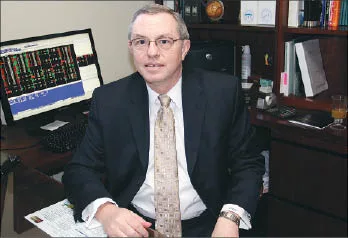Longtime financial adviser observes industry evolution
Donald Morgan sees own young practice grow; firm caters to business owners

Since entering the finance sector more than three decades ago, Spokane-based financial adviser Donald Morgan says he's seen a lot of change in the area of wealth management.
That change, he says, has been influenced by factors that include evolving technology, regulatory oversight, and the relationships between advisers and their clients, and he doesn't foresee the pace of that change diminishing.
After having spent the majority of his financial advising career with a couple of big-name financial institutions, Smith Barney and UBS, Morgan two years ago started his own practice here, named Independent Wealth Connections LLC.
The full-service financial management firm occupies a 750-square-foot office at 9507 E. Sprague, in Spokane Valley. The firm is a member of the Wells Fargo Advisors Financial Network, Morgan says, meaning its financial planning products are offered through Wells Fargo as part of a contractual agreement.
Besides Morgan, Independent Wealth Connections employs five people, including his wife, Violet, and his son, Donald Jr.
The firm provides services in the areas of personal investments, risk management, retirement planning, tax management, estate planning, and education funding, as well as financial services for small businesses.
"The way I define wealth management is the four parts of finance brought together," Morgan says. "So it's not just asset management, but liability management and risk management, and then the ultimate question of estate planning and how we transfer things to the people or organizations we care about and the legacy we leave."
In the two years since he opened his firm, Morgan says he's seen the business grow. To accommodate that growth, he's since hired two other financial advisers. He declines to disclose the number of clients Independent Wealth Connections serves or its annual revenue, but says the firm has experienced an increase in both. He anticipates that growth to continue.
Morgan says with a first-time client, he asks the same series of questions about his or her personal financial situation to determine an appropriate financial path. To do so, Morgan uses a method he describes as "the financial cross."
"Think about a blank sheet of paper and drawing a line down the middle, and on the left side you list the things you own; checking account, savings account, car, 401(k), real estate, stocks, bonds, etc.," he says.
Beneath that list of assets, Morgan says, the client's liabilities then would be noted, and on the right side of the paper would be listed sources of income, with the client's expenses shown underneath.
"With that financial planning cross in place, we can have the conversation of if you are spending more than you are earning, have a net positive savings rate, or how much your debt is costing you," he says. "We can have a conversation about what matters to you."
While he cautions that this process is just a starting point and is a static picture of a new client's financial state, understanding those four areas of the financial "cross" is crucial to laying out that client's financial road map for the future.
"The first thing that I think anyone who is serious about becoming financially responsible needs to ask themselves is if their financial cross is in balance," Morgan says. "The next questions are, 'What do you worry about?', 'What do you care about?', and, 'Where do you see yourself in five, 10, 15, 20 years from now?'"
After this initial meeting and discussion, Morgan says he would help the clients make adjustments to their investments to achieve their goals and schedule regular checkups with them to monitor their financial progress.
Morgan says that a large majority of Independent Wealth Connections' clients are business owners and that one of his practice's specialties is managing the finances of small to mid-sized businesses.
"If financial advice is challenging, where it becomes most challenging is for the business owner. So much of their wealth is concentrated in the business," he says. "We focus on the business owner, and we understand their point of view."
He says that most of Independent Wealth Connections' new clients are business owners, and that he anticipates that clientele base will continue to grow in coming years.
"I think especially the entrepreneur and the first-time business owner; that group is going to grow," he says. "I think the changing workplace will encourage entrepreneurs. The world is far less certain today, and there is a sense for some that having their own business gives them more control."
Morgan anticipates that the ever-changing face of technology also will continue to affect the way people manage their assets and make financial decisions.
"It sounds silly, but because of the regulatory infrastructure, we are rarely the early adopters of technology, but I do see it becoming more a part of what we do," he says. "We are doing webinars, and 10 years ago, who would have thought that?"
Morgan says relationships between financial advisers and their clients remain crucial to individual advisers' success, especially now as technological advances allow services and advice to be provided remotely.
"The role relationships play won't change," he says. "The way people find their advisers and keep their advisers will become more important over time. The more uncertain the world is, the more necessary planning is."
One thing related to those professional relationships that he does foresee changing, however, is the retirement of many advisers who are part of the baby boomer generation and the subsequent influx of younger advisers entering the field.
"That will lead to some real changes over the next decade," he says. "Most people in this industry giving advice are over 40 or 50, and four out of five are men. It's easy to see there will be changes, but it's hard to see what they'll look like. Clearly firms that look to the next generation are going to have an advantage as the older advisers retire."
Related Articles

_c.webp?t=1763626051)

_web.webp?t=1764835652)
